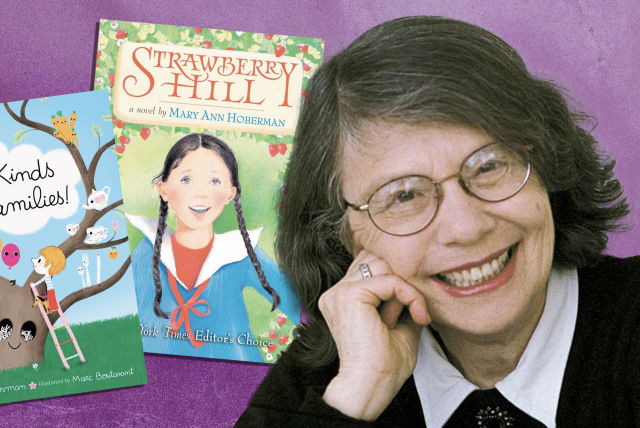Beloved Jewish children's writer Mary Ann Hoberman dies at age 92

She co-founded and performed with “The Pocket People,” a children’s theater group, and “Women’s Voices,” a group giving dramatized poetry readings.
Poet and children’s book author Mary Ann Hoberman, whose own childhood in a “very loud, raucous, opinionated” Jewish household inspired the family themes that infused her books, died on July 7 at her home in Greenwich, Conn. She was 92.
The author of dozens of children’s books, including The Llama Who Had No Pajama, The Seven Silly Eaters, and You Read to Me, I’ll Read to You, Hoberman was named “Children’s Poet Laureate” by the Poetry Foundation, a title she held from 2008-2011.
The theme of family was prominent in two of her most celebrated books, A House Is a House for Me (1978), which won a National Book Award, and All Kinds of Families! (2009), which whimsically celebrated what a sociologist might call non-traditional families.
“Eggs in a carton can seem like a family/ So can a loaf with its slices of bread/ Celery stalks or a big bunch of carrots/ They sleep in the fridge with a drawer for a bed,” she wrote.
Building her literary brand
Born Mary Ann Freedman in 1930, Hoberman said that her family moved frequently before her parents “fetched up” in New Haven, Connecticut. There, she told an interviewer, “my mother’s mother and her family lived and some of my father’s family, as well. And some of my memories have to do with this large extended family. No one had very much money. They were immigrants. There was a great warmth, a lot of Yiddish speaking — which they kept from me — because it was the secret language that grownups could communicate with.”
Those memories inspired the “very strong love” of family that she incorporated in many of her books.
“It all has to do with this very loud, raucous, opinionated family, chattering around in various languages and just drinking tea in glasses with cherries in them. That was what they did around the kitchen table,” she said. “And I, sitting there wanting to understand what they were talking about and not always succeeding, but just feeling very good to be a part of it. Yes, I loved that very much.”
She drew most explicitly on her Jewish, Depression-era childhood in Strawberry Hill (2009), a novel about Allie, a 10-year-old girl whose family moves to a new town. When a friend of a friend calls Allie a “dirty Jew,” it leads to lessons in difference and tolerance.
Hoberman grew up mostly in Connecticut, where her father was a salesman who, after some years of struggle, would found a Jewish country club, according to the Washington Post.
She received an undergraduate degree in history from Smith College in Northampton, Massachusetts, and, 35 years later, a master’s degree in English and literature from Yale University. In 1951, she married Norman Hoberman, an architect, who illustrated her first book, All My Shoes Come in Twos (1957), based on poems she had written for her children.
Her husband died in 2015; one of their sons, Perry, would later illustrate some of his mother’s books. Hoberman is survived by Perry and three other children, Diane Louie, Chuck Hoberman and Meg Hoberman; a brother, and six grandchildren.
In addition to her book-writing, Hoberman taught writing and literature from the elementary through the college level. She co-founded and performed with “The Pocket People,” a children’s theater group, and “Women’s Voices,” a group giving dramatized poetry readings.
Jerusalem Post Store
`; document.getElementById("linkPremium").innerHTML = cont; var divWithLink = document.getElementById("premium-link"); if (divWithLink !== null && divWithLink !== 'undefined') { divWithLink.style.border = "solid 1px #cb0f3e"; divWithLink.style.textAlign = "center"; divWithLink.style.marginBottom = "15px"; divWithLink.style.marginTop = "15px"; divWithLink.style.width = "100%"; divWithLink.style.backgroundColor = "#122952"; divWithLink.style.color = "#ffffff"; divWithLink.style.lineHeight = "1.5"; } } (function (v, i) { });

